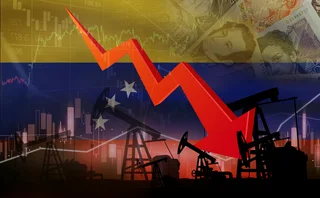Energy Risk Manager of the Year, Asia – JP Morgan
Energy Risk Manager of the Year, Asia – JP Morgan

The bank's commodities presence in the region recorded strong growth over the past two years, with revenue increasing by 327% and two high profile acquisitions having the potential to grow the business even further.
JP Morgan has been the most active investment bank in merger and acquisition activity over the past 12 months, acquiring Irish carbon origination company EcoSecurities in December 2009, and some commodities businesses from RBS Sempra in July this year. Post acquisitions, JP Morgan's 75-strong Asian commodities front-office team is centrally based in Singapore, with additional offices in Tokyo, Beijing, Shanghai, Hong Kong and Sydney.
"Over the past six months our growth story has been about inorganic acquisitions, while prior to that we've been focused on organic growth," says Oral Dawe, managing director and chief executive officer of Asia Pacific commodities group at JP Morgan. "We now have a nearly complete platform of physical and paper capabilities of precious metals, base metals and energy products," he adds.
The investment bank has had a strong presence across the Asian commodity exchanges and has been directly involved with initiatives on the Singapore Exchange (SGX) and Singapore Mercantile Exchange (SMX). The bank has been actively trading palm oil across swaps, options, exotics and investor products across the Singapore Commodity Exchange (Sicom), the Tokyo Grain Exchange (TGE), the Australian Securities Exchange (ASX) and Bursa Malaysia.
JP Morgan jumped up in this year's commodities rankings tables prepared by Energy Risk's sister publication Asia Risk, gaining first place for crude oil & refined products, gas oil, crude oil, fuel oil, naptha and structured products.
Another key development this year was JP Morgan's construction of a gold vault in Singapore to be fully functional from August 2010 to accommodate the trading of physically settled futures contracts on regional exchanges.
JP Morgan's ability to grow while competitors suffered from the impacts of the financial crisis has been a strength, says Dawe. "In some respects the financial crisis helped accelerate our growth. JP Morgan didn't have the same issues as other financial institutions and so we were able to attract clients while others were dealing with their internal issues," he adds.
JP Morgan attributes its success partly to its large geographical footprint across Asia and claims to either have the first or second spot in terms of volumes of physical cargoes across the bulk of countries in the region. "We tend to be more localised, with a deeper presence inside particular jurisdictions," says Xiuzhang Ouyang, managing director, head of energy trading for Asia at JP Morgan. "Our local currency ability is almost unrivalled – for example, when we take physical assets in certain countries, we can pay storage providers in their local currency, which means it can appreciate down the forward curve."
The investment bank was one of the first to venture in the Australian power market in December 2009, relocating one of its London-based traders to the region to specifically develop this market. "Australia is one of our most important power markets and is extremely liquid. We have a much larger footprint in Australia than any other investment bank," says Ouyang.
Another key differentiator is JP Morgan's breadth of activity, and the team constantly looks outside established regions in Asia for new business opportunities. "China is of tremendous interest but is a highly restrictive environment," add Ouyang. "China has overtaken the US as the world's largest electricity consumer, so it's a key area of interest for us. Power is an interesting product to start with in the region and we're also looking forward to making the most of leveraging opportunities there."
"We're always trying to find ways to be a global business. The influence of Asia on financial and physical commodities both in terms of price and physical uptake continues to grow year-on-year," says Tim Wilson, managing director and head of Asia marketing for global commodities at JP Morgan.
Click here to view the article in PDF format
More on Risk management
Interest in battery and flexibility soars in European energy markets
Energy traders are structuring bespoke contracts around Bess and flexibility that facilitate new ways of managing and sharing risk in this nascent market
Interview: Abaxx’s Joe Raia on LNG, Corsia and wind contracts
Abaxx’s Joe Raia talks to Energy Risk at E-World 2026 about the performance of its LNG and Corsia contracts and its latest wind contracts
Axpo interview: the rise of flexibility contracts in European power
Axpo’s Domenico Franceschino talks to Energy Risk about flexibility contracts, battery optimisation and the role of risk management in valuing these bespoke products
Energy firms revisit CTRM systems as tech advances
Energy executives mull how to tap into the explosion of new technologies entering the risk space, but systems selection must consider future business needs, writes Yefreed Ditta at Value Creed
CRO interview: Brett Humphreys
Brett Humphreys is head of risk management at environmental markets specialist Karbone. He talks to Energy Risk about the challenges of modelling outcomes in unpredictable times and how he’s approaching the risks at the top of his risk register
How geopolitical risk turned into a systemic stress test
Conflict over resources is reshaping markets in a way that goes beyond occasional risk premia
Energy Risk Debates: the influence of risk culture
The panellists examine different risk cultures and discuss the risk manager’s role and influence in creating a risk culture
Energy Risk reaction: Venezuela and oil sanctions
Energy Risk talks to Rob McLeod at Hartree Partners about the energy risk implications of the US’s control of Venezuelan oil







